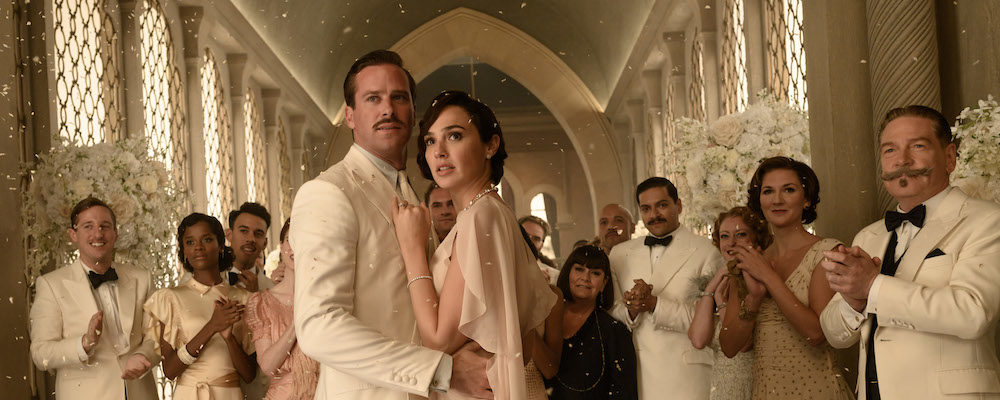Kenneth Branagh Has Exuberant Fun Turning Agatha Christie’s ‘Death on the Nile’ Into an Elegant Romp
Alci Rengifo
Put aside any qualms you may have about the idea of slightly revising a story by Agatha Christie and the new version of her 1937 novel “Death on the Nile” is a pleasant enough escape. It’s the second adaptation of a Christie tale by Kenneth Branagh, who had previously made “Murder on the Orient Express.” This sequel was originally slated for a December 2019 release before suffering through a now typical wheel of rescheduling due to the pandemic. Now that it’s here, “Death on the Nile” features the same exuberant directing Branagh brought to the last movie but with a much more focused, tight pace.
The plot begins in 1930s London, where heiress Linnet Ridgeway (Gal Gadot) locks eyes with Simon Doyle (Armie Hammer), the fiancé of her best friend and not-rich Jacqueline (Emma Mackey). Linnet and Simon become a couple and get married, with her paying most of the bills. Their honeymoon involves a getaway to Egypt, where world famous detective Hercule Poirot (Branagh) happens to be enjoying a view of the pyramids while catching up with friend Bouc (Tom Bateman). It turns out Bouc and his mother, Euphemia (Annette Bening) are part of the large party of friends Linnet and Simon have brought along to celebrate their nuptials. Poirot naturally attends the festivities as well, where he learns the couple is being stalked by a pathologically jealous Jacqueline. They ask for the detective’s help but there’s not much he can do. In an attempt to get away from Jacqueline, the couple organizes a riverboat journey to ancient Egyptian ruins. When a shocking murder ruins the getaway, Poirot has to apply his keen skills to solving the case.
Like much of Agatha Christie’s work, “Death on the Nile” has been adapted before for screen and television. A 1978 film starred Peter Ustinov as Poirot and also featured Mia Farrow and Bette Davis. There is of course the TV adaptation for the series “Agatha Christie’s Poirot,” with possibly the best Poirot of them all, David Suchet. Branagh, who just received Directing, Writing and Best Picture Oscar nominations for his wonderfully biographical “Belfast,” directed “Murder on the Orient Express” like another one of his flashy, popcorn entertainments. He goes for a more elegant tone here while still keeping it commercially fun. Branagh has always been a filmmaker of visual exuberance and his regular cinematographer, Haris Zambarlouko, shoots in 70mm, composing gorgeous wide vistas of a sun-kissed Nile, smoky nightclubs and shadowy corridors on the riverboat at night. The S.S. Karnak, the ship of the mystery, is another movie star unto itself with its rich production design. Branagh is always thinking big and sometimes steps into moments of self-indulgence, like opening a scene underwater with Nile fishes and crocodiles, then panning up to the Karnak. He also tags on an expensive prologue set during World War I, just so we can get an origin story for Poirot’s famous mustache.
Even with all of his visual mania, Branagh still succeeds in focusing on making “Death on the Nile” a more elegant thriller than the usual Hollywood offering where everything is settled with massive shootouts. He casts the suspects well and like any worthy whodunit, much of the enjoyment here is in juggling the large cast. Branagh and writer Michael Green tweak a few aspects of the Christie novel, but they keep the character lineup intact. Even the actors strapped with more somber roles, like Gadot and Hammer, look to be having a great time. There’s also Letitia Wright as Rosalie, daughter of blues singer Salome Otterbourne (Sophie Okonedo), who was invited to provide music for the ill-fated journey. Russell Brand is nearly unrecognizable as Linus Windlesham, a doctor who once loved Linnet but was brushed aside for Simon. Jennifer Saunders brings some straight-faced comic relief as Marie Van Schuyler, the socialite-turned-Communist traveling with companion Bower (Dawn French). One can instantly suspect Katchadourian (Ali Fazal), Linnet’s lawyer and cousin, who is all too eager to put wills in front of her to sign.
Branagh never makes the story too confusing and sticks to Christie’s influential knack for making it all come together into full clarity by the end. A very keen observer might just solve it half-way through and still enjoy the visual lushness and acting. Gadot glows as if taken out of some ‘30s classic and the directing revels in melodrama. Branagh brings a welcome dry sense of humor to Poirot, making believable those long rambles where the detective rapidly describes how he put clues together out of scarfs, paint and the weight of a small pistol. “Death on the Nile” never becomes a riveting brain-teaser in the spirit of “Knives Out,” yet it never drags. The ending is quick and almost ludicrously operatic, but at least we get some good answers to who shot whom, or who the strange caped figure rushing down the hallway was. Branagh even tags on a little bit of romance for Poirot, although the final shot commits an ultimate sin when it comes to the absurdly large mustache. Time will tell if Branagh will continue diving into the Christie catalog. This selection may not reinvent a genre, but it’s a good two hours of style and panache.
“Death on the Nile” releases Feb. 11 in theaters nationwide.

